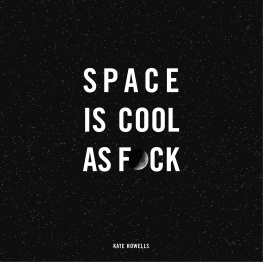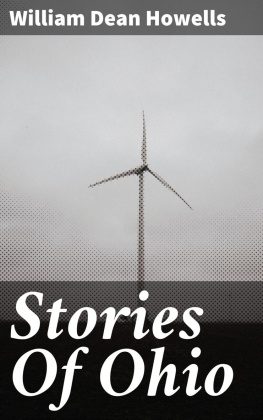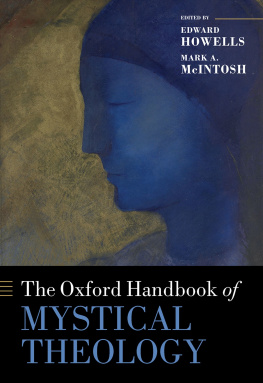Kate Howells - Space Is Cool as F*ck
Here you can read online Kate Howells - Space Is Cool as F*ck full text of the book (entire story) in english for free. Download pdf and epub, get meaning, cover and reviews about this ebook. year: 2021, publisher: Andrews McMeel Publishing, genre: Romance novel. Description of the work, (preface) as well as reviews are available. Best literature library LitArk.com created for fans of good reading and offers a wide selection of genres:
Romance novel
Science fiction
Adventure
Detective
Science
History
Home and family
Prose
Art
Politics
Computer
Non-fiction
Religion
Business
Children
Humor
Choose a favorite category and find really read worthwhile books. Enjoy immersion in the world of imagination, feel the emotions of the characters or learn something new for yourself, make an fascinating discovery.
- Book:Space Is Cool as F*ck
- Author:
- Publisher:Andrews McMeel Publishing
- Genre:
- Year:2021
- Rating:5 / 5
- Favourites:Add to favourites
- Your mark:
- 100
- 1
- 2
- 3
- 4
- 5
Space Is Cool as F*ck: summary, description and annotation
We offer to read an annotation, description, summary or preface (depends on what the author of the book "Space Is Cool as F*ck" wrote himself). If you haven't found the necessary information about the book — write in the comments, we will try to find it.
Space Is Cool as F*ck — read online for free the complete book (whole text) full work
Below is the text of the book, divided by pages. System saving the place of the last page read, allows you to conveniently read the book "Space Is Cool as F*ck" online for free, without having to search again every time where you left off. Put a bookmark, and you can go to the page where you finished reading at any time.
Font size:
Interval:
Bookmark:


Space Is Cool as Fuck text copyright 2017, 2020 Pantera Press. Created by Martin Green. This edition 2020 Andrews McMeel Publishing. All rights reserved. No part of this book may be used or reproduced in any manner whatsoever without written permission except in the case or reprints in the context of reviews.
Andrews McMeel Publishing
a division of Andrews McMeel Universal
1130 Walnut Street, Kansas City, Missouri 64106
www.andrewsmcmeel.com
First published in Australia in 2017 by Pantera Press Pty Limited;
this revised edition published in 2020.
P.O. Box 1989, Neutral Bay, NSW, Australia 2089
ISBN: 978-1-5248-6297-8
Library of Congress Control Number: 2020942024
Author: Kate Howells with contributions from Garrett Johnson, Laura Pumphrey, Madeline Glowicki, and Scott Koenig
Editor: Kevin Kotur
Production Editor: Elizabeth A. Garcia
Production Manager: Tamara Haus
Ebook Production: Kristen Minter
ATTENTION: SCHOOLS AND BUSINESSES
Andrews McMeel books are available at quantity discounts with bulk purchase for educational, business, or sales promotional use. For information, please e-mail the Andrews McMeel Publishing Special Sales Department: specialsales@amuniversal.com.
Contents
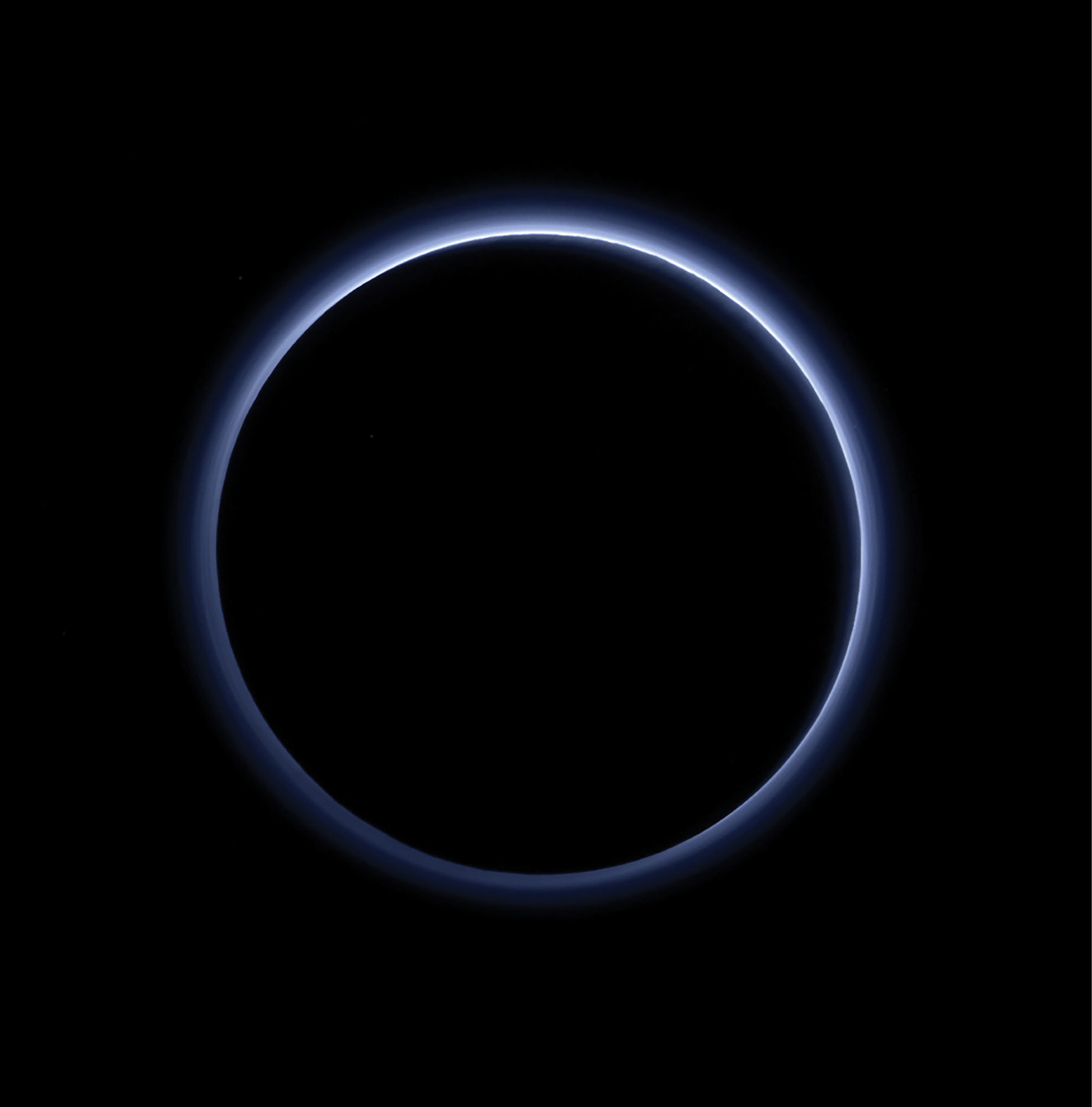
Blue haze over Pluto NASA/JHUAPL/SwRI
Introduction
S pace is fucking dope. The universe is big, wonderful, and crazy. Its hugeincomprehensibly so. You and all your friends and everyone youve ever loved and all the cool shit you like, youre in it, this one gigantic thing that just exploded out one day and started being. And its got volcanoes, aliens and dinosaurs, and rocks hurtling around at mind-boggling speeds, flying through the cosmos, each their own little world. Some are completely inhospitable, some have so little gravity that you can basically fly, and some have diamond storms. Anything that you can even imagine is happening somewhere up in this bitch right now.
This is no textbook. We love space, and like fools in love, we want to shout it from the rooftops. We want to share our love with everyone, but science has a tendency to be a little tough to digest. Which is what this book is for. We are not experts but simply enthusiastswe want to give you a little taste of the glorious reality you inhabit by providing an introduction to some of the incredible stuff out there, told plainly in the tongue of the common people.
We hope this will encourage you to learn more. The people of this planet are connected by a magical network of information systems that we call the internet, where you can dive right in. The deeper you dig, the cooler it gets.
Learn some shit, and tell your friends. Cause this space stuff is out of control.
One of the most pressing questions weve ever faced as a species is where the fuck did this all come from? How did this mind-blowingly huge collection of matter and radiation that we call the universefrom galaxies that are a million light-years across down to the quarks inside of an atomcome to be? According to smart people in white coats, it was a rapid, spontaneous expansion of space called...

OK, hear them out.
In 1929, Edwin Hubble (the guy the big space telescope is named after) observed that faraway galaxies are moving away from us. Not only that, but the farther away they are, the faster away they move. He took this to mean that all observable parts of the universe are moving away from each other. Galaxies are still moving away from each other today, so that should mean that they were closer together and hotter in the past. Scientists proposed that this expansion could be traced back to a single point, from which a cosmological clusterfuck erupted in every direction. Hence, the big bang theory.
People were skeptical, naturally. When someone tells you that were flying on a giant rock through a continuously expanding space bubble of matter and radiation that started as a subatomic singularity 13.8 billion years ago, youre likely to scoff. But almost all of the evidence that physicists have gathered supports the ideasame with cosmic background radiation and Einsteins theory of general relativity.
So what the fuck actually happened during the big bang? Heres our best guess.
First, there was a singularity. Singularities are points in space and time that cant be described by our laws of physics, like black holes. Theyre currently a big red question mark on physicists drawing boards. But anyway, from this singularity we all of a sudden get a hot, dense, rapidly expanding chunk of universe. And we mean rapidly.
Our universe started out as an infinitesimally small bowl of soup, so to speak, where gluons and quarks flew around and smashed into each other. This soup was so hot and compact that matter and energy were practically the same thing.
Then, as it grew in size, our soup settled ever so slightly, and quarks became neutrons and protons, the building blocks of atoms as we know them. And as all this was happening, our little bowl of soup ballooned in size from the atomic level to 100 billion kilometers across.
Oh yeah, remember when we said this was rapid? All we just described happened in less than a second.
Hydrogen, our first element, soon formed. The universe at this point was about 10 billion C, which is over 600 times hotter than the goddamn surface of the Sun.
Things slowed down a bit from there. In the next few minutes, the universe got cooler and less active. There were no stars yet, and all this hydrogen gas prevented any visible lightthough it didnt matter because there wouldnt be anything with eyes for well over 12 billion years.
Then, over the next 300,000 years, hydrogen gas clumped together, gravity squeezed the fuck out of it, and we got our lovely stars and galaxies. Hydrogen gas dissolved into a plasma that allowed visible light, and we basically got the universe as we know it.
Ta-da!
Check This Shit Out
The universe has continued expanding ever since the big bang got things going. Its getting bigger and bigger all the time, and its actually speeding up. Which is a pretty wacky thing to think about. The universe is, by definition, everything that exists, including empty space. So if its expanding, whats it expanding into? What was out there beyond the edge of the universe before the universe got big enough to occupy that space? We dont have any answers for you!


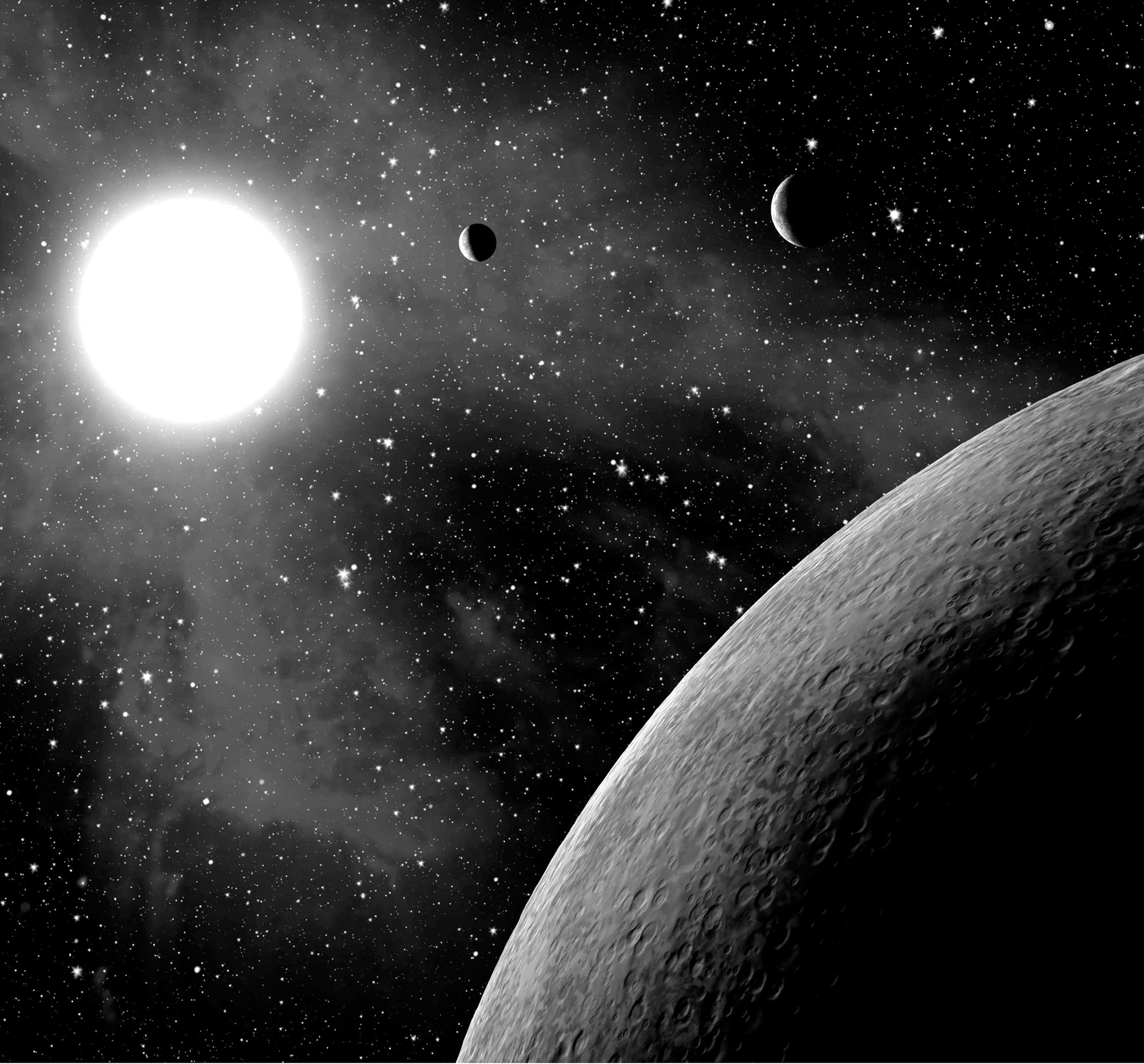
KOI-961 exoplanet system NASA/JPL-Caltech

LEFT: brett randall
RIGHT: caroline Levasseur
Scientists have long known that the Sun is a star and the Earth is just one planet orbiting it. We know that there are shitloads of other stars too, but scientists have never known for sure whether there were other planets in orbit around them.
Font size:
Interval:
Bookmark:
Similar books «Space Is Cool as F*ck»
Look at similar books to Space Is Cool as F*ck. We have selected literature similar in name and meaning in the hope of providing readers with more options to find new, interesting, not yet read works.
Discussion, reviews of the book Space Is Cool as F*ck and just readers' own opinions. Leave your comments, write what you think about the work, its meaning or the main characters. Specify what exactly you liked and what you didn't like, and why you think so.

